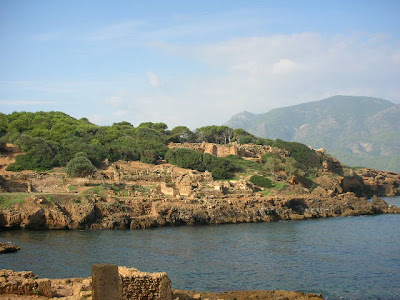Translating Medusa

As I spend hour after hour translating, as I encounter words, phrases, intonations and conversational textures that are uniquely American, and therefore not fully translatable into French, my mind sometimes wanders into theoretical issues of translation. One of the simultaneously beautiful yet deeply frustrating things about the translation of a given text is its elusive quality: I think no two people, no matter how talented and brilliant at translating, could possibly produce the same translation of a text. I have an image of the text as one creature with many heads, each who speaks in a different voice. Each voice of this creature has its own cadence and sound quality, each a different use of breath. To the part of me that is poetic, this chorus of voices is enchanting. To the precision oriented, absolute-answer desiring component of myself, this chorus is maddening. Should I translate a phrase as "in the beginning" or "at the beginning" ?
Generally I have terrible insomnia. Questions such as these above, in addition to existential ones, open-ended and answerless all, buzz through my thoughts and keep me from sleep. Unfortunately my mind likes very much to travel at night to abstract ideas or to distant places. It happens like clock-work; I lie down in bed and suddenly my rebellious mind wants not just to leave that bed, but also this apartment, this street, this city...And so I try to read a little something unrelated to my work when I go to bed in order to quiet my mind. I had until recently been reading "Funny in Farsi," which worked quite well for this purpose. When the writing is too good, however, the sentences too rich, the images too engaging, the activity backfires, stirring up additional thoughts and feelings that fuel the mental fire keeping me awake. Like an addict, though, I cannot stop, cannot put down a book I find engaging. At present I have discovered a book of Camus' essays called "Noces" written between 1936 and 1937, published originally in small number in Algiers in 1938. These essays, along with Paul Bowles' writings, ring through my mind like a love song to North Africa. Camus has a way of describing light like no other writer I have yet encountered; he has a way of making the light a character in his narratives in a way that makes me deeply envious. He writes simply and directly, but with a regular, rolling rhythm that calls to my mind the blue waves of the Mediterranean, lapping at the Moroccan (and no doubt Algerian) shore. Take for example the opening sentences of his essay, "Noces à Tipasa":
"Au printemps, Tipasa est habitée par les dieux et les dieux parlent dans le soleil et l'odeur des absinthes, la mer cuirassé d'argent, le ciel bleu écru, les ruines couvertes de fleurs et la lumière à gros bouillons dans les amas de pierres. A certaines heures, la campagne est noire de soleil. Les yeux tentent vainement de saisir autre chose que des gouttes de lumière et de couleurs qui tremblent au bord des cils. L'odeur volumineuse des plantes aromatiques racle le gorge et suffoque dans la chaleur énorme. A peine, au fond du paysage, puis-je voir la masse noire de Chenoua qui prend racine dans les collines autour du village, et s'ébranle d'un rythme sûr et pesant pour aller s'accroupir dans la mer.
Nous arrivons par le village qui s'ouvre déjà sur la baie. Nous entrons dans un monde jaune et bleu où nous accueille le soupir odorant et âcre de la terre d'été en Algérie..." (1)
Nous arrivons par le village qui s'ouvre déjà sur la baie. Nous entrons dans un monde jaune et bleu où nous accueille le soupir odorant et âcre de la terre d'été en Algérie..." (1)

I will translate this passage later both for those who do not speak French and as an exercise for myself. But first, I wonder if any of my fellow french speakers would like to contribute a translation? I think it would be interesting to post several different translations of the same piece. If I have no takers, I will have to post only my translation!
Anyway, instead of sleeping when I ought to have last night, I became very curious about Tipasa. The pictures I found online; I didn't cite the sources, because you can easily find the same images yourself by typing "Tipasa" into a google image search. I don't know anyone who has been here, but it looks amazing. Enchanting, even. If you have been, please tell me...
Anyway, instead of sleeping when I ought to have last night, I became very curious about Tipasa. The pictures I found online; I didn't cite the sources, because you can easily find the same images yourself by typing "Tipasa" into a google image search. I don't know anyone who has been here, but it looks amazing. Enchanting, even. If you have been, please tell me...



THWAP! Her sweet smile could not mask the hard slap of the gauntlet hitting the ground.
ReplyDeleteIf my French had improved over the past few years I would attempt a translation but unfortunately I think I've regressed terribly. I shall wait for your translation!
ReplyDeleteI would occasionally translate Russian-English and English to Russian. I feel your pains. My recent accomplishment is one of my mother's poems - translating poetry adds another interesting level - keeping the rhyme, rhythm, allusions, etc.
ReplyDelete